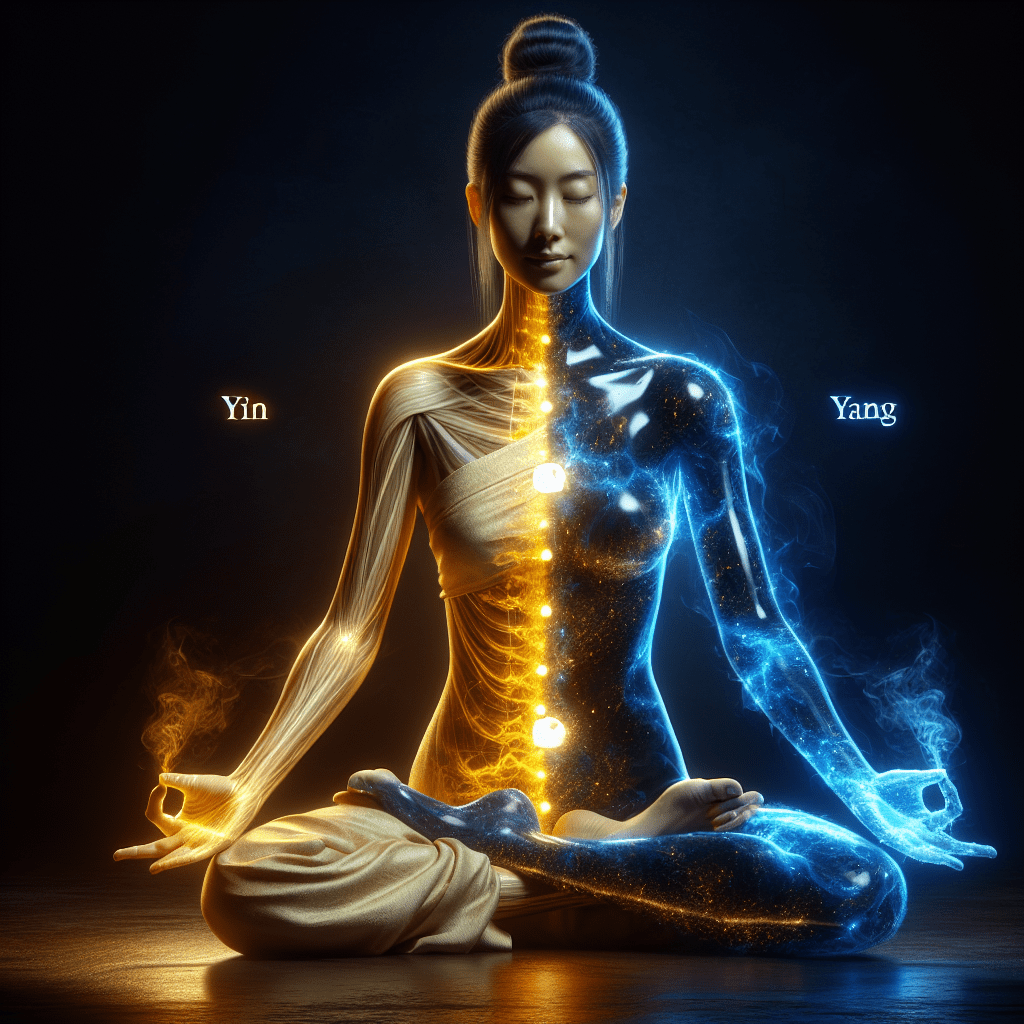In our fast-paced world of constant notifications, packed schedules, and never-ending to-do lists, there’s an energy we often push aside—the quiet, nurturing power of Yin. While our society celebrates action, productivity, and visible results (all Yang qualities), we frequently overlook the restorative potential of Yin energy, especially when it comes to our mental health.
Yin energy embodies the receptive, intuitive, and nurturing aspects of life. It’s the gentle moonlight to Yang’s bright sunshine, the restful winter to summer’s activity, the peaceful inhale that must follow every energetic exhale. In Eastern philosophy, these complementary forces create balance in all things—including our minds.
But what exactly is this Yin energy, and why does your mental wellbeing depend on it more than you might realize?
Understanding Yin Energy: The Quiet Strength
Yin energy represents the cooling, calming, and introspective qualities in life. It’s characterized by receptivity rather than action, intuition rather than logic, and nurturing rather than producing. Think of moments when you’re deeply listening, quietly reflecting, or simply being rather than doing—that’s Yin energy at work.
In traditional Eastern medicine, Yin qualities include:
- Stillness and rest
- Receptivity and openness
- Intuition and inner wisdom
- Nurturing and self-care
- Darkness and coolness
- Inward focus
These qualities might not grab headlines in our achievement-oriented culture, but they form the essential foundation for sustainable mental health. Just as a tree needs strong roots (Yin) before it can grow tall branches reaching for the sun (Yang), our mental wellbeing requires a solid foundation of Yin energy.
“The gentle nature of Yin allows practitioners to cultivate awareness of their bodies and emotions without the pressure to perform or achieve,” notes many Eastern medicine practitioners. This absence of pressure is precisely what our anxious minds often need most.
The Mental Health Benefits of Embracing Yin
The power of Yin for mental health lies in its ability to counter the chronic stress that characterizes modern life. When we activate Yin energy through receptive practices, we stimulate the parasympathetic nervous system—our body’s “rest and digest” mode—which naturally reduces anxiety and promotes emotional healing.
Research increasingly supports what Eastern traditions have known for millennia: practices that cultivate Yin energy offer significant mental health benefits:
- Stress reduction: Yin-focused activities lower cortisol (stress hormone) levels, creating a biochemical state of calm.
- Emotional regulation: The space created by Yin practices allows emotions to surface and be processed healthily rather than suppressed.
- Improved sleep quality: By calming the nervous system, Yin energy helps establish healthier sleep patterns.
- Enhanced self-awareness: The introspective nature of Yin practices builds greater emotional intelligence and self-understanding.
- Mental clarity: When the mind isn’t constantly stimulated, it can sort through thoughts more effectively.
One of the most accessible ways to experience the power of Yin for yourself is through the practice of meditation. Just 10 minutes of quiet sitting, focusing on breath, activates Yin energy and creates a mental sanctuary from the constant demands of modern life. Studies show regular meditators experience lower rates of anxiety and depression while reporting greater overall life satisfaction.
Another powerful Yin practice is gentle yoga, which combines physical relaxation with mental stillness. Unlike more vigorous Yang-style exercises that build heat and energy, gentle yoga practices create space for release and renewal—exactly what an overworked nervous system needs.
Yin Yoga: A Gateway to Mental Wellbeing
Among the most effective tools for cultivating the power of Yin is Yin Yoga—a practice specifically designed to work with the body’s connective tissues through long-held, passive poses. Unlike more dynamic yoga styles, Yin Yoga involves holding gentle postures for three to five minutes (sometimes longer), allowing for a deep release of both physical and emotional tension.
Yin Yoga works on multiple levels to support mental health:
First, the physical holding of poses targets fascia—the connective tissue that stores emotional memory in the body. As we gently stretch these tissues, we create opportunities for emotional release.
Second, the stillness of each pose creates a container for mindfulness. With nowhere to go and nothing to “achieve” in the pose, practitioners naturally turn inward, developing their capacity for self-awareness and presence.
Third, the practice stimulates energy meridians (called nadis or channels in Eastern traditions), which according to traditional medicine, helps release blockages that can manifest as emotional distress.
“The practice of Yin Yoga allows individuals to explore their inner thoughts and sensations, helping them to heal and let go of past traumas or energy blocks,” explains research into somatic (body-based) healing approaches.
A typical Yin Yoga sequence might include:
- Butterfly pose for hip opening (associated with emotional release)
- Sphinx pose for gentle backbending (linked to heart opening)
- Dragon pose for deep hip flexor release (where we often store stress)
- Supported fish pose for chest expansion (enhancing breath capacity)
Even a short Yin practice can reset your nervous system and create space for emotional processing that busy life rarely allows. As one practitioner shared, “We’re going to do some Yin poses along with some somatic tools to help you release any sort of exhaustion.” This combination of physical holding and mental awareness makes Yin Yoga particularly powerful for mental wellbeing.
Self-Compassion: The Emotional Face of Yin Energy
Perhaps the most transformative aspect of embracing the power of Yin is how it nurtures self-compassion—that gentle, accepting attitude toward ourselves that research has linked to greater emotional resilience and reduced anxiety and depression.
Yin energy embodies self-compassion through:
- Acceptance rather than striving: Embracing what is rather than constantly pushing for what “should be”
- Presence with difficult emotions: Creating space to feel without immediate fixing or avoiding
- Non-judgment: Observing thoughts and feelings without labeling them good or bad
- Self-soothing: Developing internal resources to comfort oneself during distress
These qualities act as powerful antidotes to the harsh inner critic many of us carry. By cultivating Yin energy, we develop the ability to be our own emotional anchor during life’s inevitable storms.
One simple self-compassion practice that harnesses the power of Yin is the self-compassion break. When facing a difficult moment, try:
- Acknowledging suffering (“This is a moment of suffering”)
- Recognizing our common humanity (“Suffering is part of life; I’m not alone”)
- Offering kindness to yourself (place a hand on your heart and offer words of comfort)
This brief practice activates Yin energy by turning toward difficulty with receptivity rather than resistance. As we develop this capacity, we build emotional resilience—the ability to bend without breaking under life’s pressures.
Rest and Recovery: Yin’s Gift to Mental Wellness
Perhaps nowhere is the power of Yin more evident than in its relationship to rest and recovery—elements our achievement-focused culture often devalues but which are absolutely essential for mental health.
The science is clear: our brains require downtime to process experiences, consolidate memories, and clear metabolic waste. Without adequate rest—both sleep and wakeful relaxation—cognitive function declines, emotional reactivity increases, and mental health suffers.
Yin-focused rest practices include:
- Deep breathing exercises: Simple belly breathing activates the parasympathetic nervous system
- Body scanning: Systematically relaxing each body part while lying down
- Guided relaxation: Using audio guidance to release tension throughout the body
- Gentle walking in nature: Moving slowly and receptively through natural settings
- Restorative yoga: Using props to support complete relaxation in gentle poses
Even short periods of intentional rest can significantly impact mental wellbeing. “Improved sleep and a regular Yin yoga practice, alongside massage, can help regulate and calm the nervous system and reduce stress levels,” notes research on holistic approaches to mental health.
By honoring our need for rest through Yin practices, we’re not being “lazy” or “unproductive”—we’re actually creating the necessary conditions for sustainable mental health and clear thinking.
Balancing Yin and Yang for Optimal Mental Health
While this article highlights the often-neglected power of Yin energy, true mental wellbeing comes from balancing both Yin and Yang qualities. Just as nature requires both rest and activity, darkness and light, our psyches need both receptivity and productivity, stillness and movement.
The Taoist concept of balance offers wisdom for our mental health journey. As one practitioner explains, “The yin-yang symbol teaches us that opposites are interconnected and interdependent. In mental health, this means acknowledging both our strengths and vulnerabilities.“
Signs your mental health might need more Yin energy include:
- Chronic anxiety or feeling “wired but tired”
- Difficulty sleeping despite physical exhaustion
- Emotional numbness or disconnection
- Constant mental chatter or racing thoughts
- Feeling overwhelmed by minor stressors
- Inability to simply be without doing something
If these resonate, consider how you might invite more of the power of Yin into your life through practices mentioned throughout this article.
At HerbalsZen, we understand that true wellbeing emerges from honoring ancient wisdom about balance while applying it to modern life. Our approach integrates the 2,000-year-old understanding of Yin and Yang with contemporary knowledge about mental health—recognizing that sustainable wellness requires honoring both energies.
Embracing the Power of Yin in Daily Life
As we conclude, consider how you might welcome more Yin energy into your daily routine:
- Create pockets of silence during your day—even five minutes of sitting quietly can activate Yin energy
- Practice “single-tasking” instead of multi-tasking, giving full attention to one activity
- Spend time in nature with a receptive attitude, allowing yourself to absorb its rhythms
- Try a Yin Yoga class or follow a gentle online sequence
- Develop a bedtime ritual that honors the transition to rest
- Journal about your feelings without trying to fix or change them
Remember that embracing Yin isn’t about abandoning productivity or action—it’s about creating the balance that sustains them. Just as a field needs to lie fallow occasionally to produce abundant crops, your mind needs periods of Yin restoration to function at its best.
The power of Yin offers a profound but simple truth: sometimes the most productive thing you can do for your mental health is nothing at all. In that space of receptive being, you’ll find the renewal your mind has been silently craving all along.



